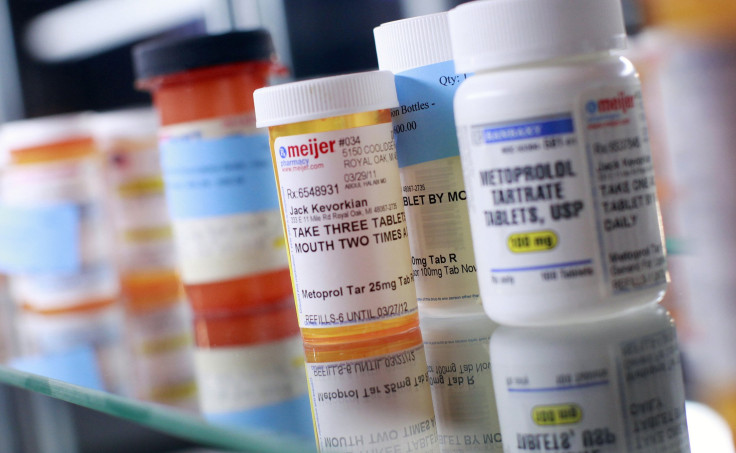Should Government Control The Price Of Prescription Drugs?

Democratic presidential candidate Hillary Clinton lashed out this week at the head of Turing Pharmaceuticals over an egregious price hike for a medicine that treats a deadly infection. And although Clinton shortly rolled out her own plan to lower drug costs, there is great political disagreement about how to solve the problem of ballooning drug prices. Many attempts have failed spectacularly in Congress, creating a sense of despondency among patients who are desperate for more affordable treatments.
Americans have heard multiple proposals to rein in the high cost of prescription drugs lately, most notably from Clinton and Democratic rival Sen. Bernie Sanders of Vermont. But so far, no candidate has proposed what is perhaps the most straightforward and surefire way to guarantee that prices do not creep steadily upward: government price controls.
The controversial policy is instituted in many countries around the world. But critics say if it were implemented in the U.S., it would have an outsize effect and dramatically stall investment and innovation in the pharmaceutical industry and compromise the health of future patients.
Price controls are when government tinkers with one of the most fundamental rules of economics – that price should reflect consumer demand. Instead of relying on demand to drive price, the government sets a minimum (called a price floor) or a maximum (known as a price ceiling) that can be charged for a product or service.
There’s no doubt that price controls are “a serious step,” in the words of Jared Bernstein, a senior fellow at the Center on Budget and Policy Priorities and former chief economist and economic adviser to Vice President Joe Biden. “I think it's pretty outside the political mainstream,” he says.
However, at least 11 countries in the Organization for Economic Cooperation and Development employ some form of price control for drugs, according to a report by the U.S. International Trade Administration. As a result, aggregate prices for popular patented drugs are 18 to 67 percent lower in those nations than in the U.S.
Most economists abhor the idea of price controls except in the case of emergencies such as an extreme shortage of an essential good. They say price ceilings in the pharmaceutical industry will stifle competition and discourage innovation.
“If you impose price controls on the U.S., you will have a dry-up of capital investment,” John Graham, a health economist at the National Center for Policy Analysis, says. “We saw that when Hillary Clinton just sent a tweet before she announced her plan. The stock prices in biotech and pharmaceuticals went down by 3.5 percent.”
Graham and other critics say if companies can no longer reap the same profits they once made from medicines, there is less incentive for them to create new and better treatments. Investors and employees might flee to other industries where they are still permitted to seek limitless profits.
A 2008 Rand Corporation analysis found that imposing price controls on prescriptions that reduced manufacturers’ revenue by 20 percent would bring a “modest” financial savings of about $1,100 per person for consumers in the short term, but ultimately reduce the life expectancy of patients by 0.7 years by 2060. Instead, analysts suggested policies to reduce patient copays while preserving the profits of pharmaceutical companies.
But supporters of price controls say traditional economic rules don’t apply to the prescription drug market. Prescription drugs are sold through a convoluted market built on temporary monopolies created by generous patent protection, in which companies arbitrarily set a price they believe they can persuade insurers and the government to pay. Those anomalies have created an unfair system in which pharmaceutical companies earn excessive profits while patients endure outsize costs.
Bernstein says these are the points that economists miss in their “knee-jerk” reaction to price controls. He and other proponents say price controls are the best way to ensure that pharmaceutical companies remain profitable and that patients get the best possible deal on their prescriptions.
“If we were talking about pork bellies, I'd be with them 100 percent,” he says. “But we're talking about a market where we just saw an example of a price jumping thousands of percentage points overnight. Clearly this is a very distorted market fraught with deep protectionism.”
To answer critics’ concerns about innovation, Bernstein suggests finding creative new ways to reward originality such as offering a generous cash prize for inventing beneficial new medicines, and growing the National Institutes of Health to subsidize the expensive stages of early research for pharmaceutical companies.
Graham says the smartest approach to lowering drug costs is to reduce the amount of money pharmaceutical companies must spend to create new medicines. This starts, he says, with shrinking the “massively burdensome” U.S. Food and Drug Administration, which approves all new drugs. He supports measures contained in the 21st Century Cures Act, which has passed the House and will be taken up by the Senate this fall. That legislation aims to streamline the FDA approval process so that pharmaceutical companies can debut more medicines at a reduced cost.
So far, no presidential candidate has been so bold as to propose price controls for prescription drugs. Clinton’s plan, which she laid out in a speech in Iowa on Tuesday, includes a $250-a-month cap on out-of-pocket drug costs for patients with chronic diseases. Sanders, who has long advocated around this issue, proposed a series of pricing reforms in legislation earlier this month, including a ban on the practice of companies paying each other to not produce generic versions of patented medicines.
Even Bernstein says price controls should be a last resort, considered only after all the measures proposed by Clinton and Sanders have been tried. But he also has little confidence that any of those other policies will put a dent in prescription drug prices. That’s why he says it’s time to bring price controls to the table.
© Copyright IBTimes 2024. All rights reserved.






















